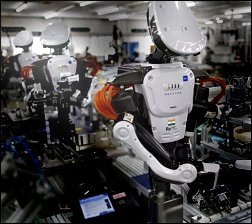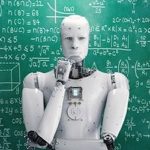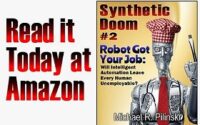The Promise and Peril of the Universal Basic Income
 Providing citizens with an unconditional automatic income, trending lately as the Universal Basic Income or UBI, as a means of mitigating possible social collapse due to explosive, automation-driven unemployment, is now being viewed with double-vision by tech gurus, politicians and the public alike as potentially a very good thing for our advancing civilization, or possibly, a very horrible one.
Providing citizens with an unconditional automatic income, trending lately as the Universal Basic Income or UBI, as a means of mitigating possible social collapse due to explosive, automation-driven unemployment, is now being viewed with double-vision by tech gurus, politicians and the public alike as potentially a very good thing for our advancing civilization, or possibly, a very horrible one.
Without a doubt though, the transition from rat-race to lifelong retirement — however it occurs — stands to be tumultuous, potentially violent and possibly too late to stop once it begins.
I believe a UBI-type solution to mass unemployment will be seen as increasingly necessary as automation, especially in the form of androids that can move around in physical space and perform unstructured tasks, become more and more widespread through the workforce. These coming disruptive devices are going to make huge tracts of ordinary working people unemployable. Not just unemployed, UNEMPLOYABLE — meaning that there will be nothing anyone will be able to do to create an income for themselves that a robot isn’t already doing out there somewhere, AND doing better than YOU working 24/7 with no pay.
These swelling legions of desperate people must have some kind of support delivered to them quickly, or there are going to be huge labor riots, food panics, massive social disruption and every other sort of bad thing that you can imagine. And it will be happening everywhere throughout the world as global businesses hotly compete to ‘de-payroll’ and automate their production lines, offices and retail stores. The UBI could be the only thing standing between a dystopian world consisting of 90 percent poverty-stricken masses vs. the 10 percent robot-owning mega-wealthy.
And you can guess who likely comes out on top in this seriously unbalanced world.
 However, a widespread UBI-supported population could also become unstable in several other, less explosive but still deadly ways. There’s a line of thought that if people are allowed to just exist in a purposeless sort of fashion, without the need to deliver any sort of skilled input into society, that too many of us are going to descend into a kind of wastrel lifestyle focused on drugs, alcohol, wanton sex and over-consumption of crazier and more bizarre entertainment — all eventually ending in complete and total boredom.
However, a widespread UBI-supported population could also become unstable in several other, less explosive but still deadly ways. There’s a line of thought that if people are allowed to just exist in a purposeless sort of fashion, without the need to deliver any sort of skilled input into society, that too many of us are going to descend into a kind of wastrel lifestyle focused on drugs, alcohol, wanton sex and over-consumption of crazier and more bizarre entertainment — all eventually ending in complete and total boredom.
Could this happen? Will each one of us become coddled Roman emperors… lying around while beautiful fembots feed us grapes and take care of our every need?
Well, it won’t happen overnight. I believe that whatever social impact happens due to the transition from human to synthetic labor is going to be on us shockingly fast when it ultimately hits. Mass unemployment is going to trigger one crisis after another as the ultimate adoption and rollout of the UBI will almost certainly be fitful and unequal among various different nations, depending on the work ethic involved in that particular society or culture.
There is a growing alternative idea that governments could also help out their citizens, not just by giving them free money, but also by providing them with something along the line of “non-essential fulfillment employment” — human-only jobs contracted by the government for the express purpose of creating a more stable social order by helping people find some purpose in their “Roman Emperor” lives. A break from all that soft life and pointless partying.
 Do you think it will ever come to this?
Do you think it will ever come to this?
Well, it could. There is a certain stigma attached to the idea of a make work job — charity for some dimwit that can’t do a “real job”. But things change as the generations slip by and stigmas from the past fade away. I’m sure alternative work will have a more inspiring name attached to it rather than the derogatory “make work job”… (people powered products?). Whatever it’s called, it will be a recognition of the fact that it is important for people to have purposeful activity in their lives. Non-synthetics (us!) could still do meaningful work in child care, teaching or political / journalism-type jobs. Professions that require a fair amount of emotional connection and caring will likely continue to be difficult for synthetics to excel in for some time.
Since the proverbial “good paying job” will no longer be a practical goal in a hyper-automated world, why bother to get educated at all? Perhaps to avoid the social stigma of NOT having a formal education?
We could go back to viewing education as a purposeful endeavor in its own right, one to be enthusiastically embraced simply for the joy of learning!… (not to mention the status that being degreed conveys to one socially). This, as opposed to the more mercenary way that we tend to view (higher) education today… mainly as a vehicle to gain a valuable skill that one can use to find a lucrative career.
Educated people tend to be happier as well, which is the ultimate goal of the Unconditional Basic Income, is it not? To keep people happy, not just alive? Content people also are easier to deal with, generally less violent and make for better citizens. In a future where everything is handled by artificial intelligence, we may no longer need to know how to build a rocket engine or a microchip, but there will be continuing value in knowing about our history, great literature, the sciences, human psychology and all sorts of interesting subjects that we might nowadays consider “soft or liberal arts” type studies.
Since making money will no longer be the point of any form of education, universities will need to reevaluate their reason for existing (I’m sure they’ll think of something brilliant). As some great philosopher once wrote: “work keeps at bay three great evils — boredom, vice and need”. While the ‘need’ part of this equation will no longer be relevant, social scientists would still like to keep the boredom and the vice away, and so there is still a great deal of value in keeping people chasing some sort of life goals.
 Mass automation is also sure to remove a valuable pathway to fulfillment for people who have a powerful need to link their self-worth to personal achievement. Without this internal driving force they will feel diminished. This is irrational, but humans experience their competitive survival spirit very powerfully, and many of us are compelled to act on it. Sadly however, this desire to use our unique talents and the success that it brings to signal to others that we are better than them is going to have to go completely out of style, especially if we are going to survive in a UBI-equalized society without engaging in constant, passive-aggressive “slap-fighting” with each other.
Mass automation is also sure to remove a valuable pathway to fulfillment for people who have a powerful need to link their self-worth to personal achievement. Without this internal driving force they will feel diminished. This is irrational, but humans experience their competitive survival spirit very powerfully, and many of us are compelled to act on it. Sadly however, this desire to use our unique talents and the success that it brings to signal to others that we are better than them is going to have to go completely out of style, especially if we are going to survive in a UBI-equalized society without engaging in constant, passive-aggressive “slap-fighting” with each other.
Consider also that the idea of millions of androids generating all the actual wealth in the world with their super-human abilities — and then simply gifting most of that wealth to the increasingly disconnected and simpleminded humans — is not going to sit well with a lot of people. Cooperation across political, ethnic and economic boundaries will be crucial, especially if every human becomes effectively subservient to legions of synthetic workers who may end up essentially running every aspect of society.
If automation completely takes over and people are dis-employed en masse long term, it could only take a few short generations for us to become comfortable living as wards of an all-encompassing synthetic labor force — possibly to the extent of even being governed by artificial intelligence! And, while we may eventually become little more than AI’s domesticated pets, it certainly won’t happen overnight — and you can be sure that a lot of people are going to make a lot of trouble before we ultimately lie down before our mechanical masters.





